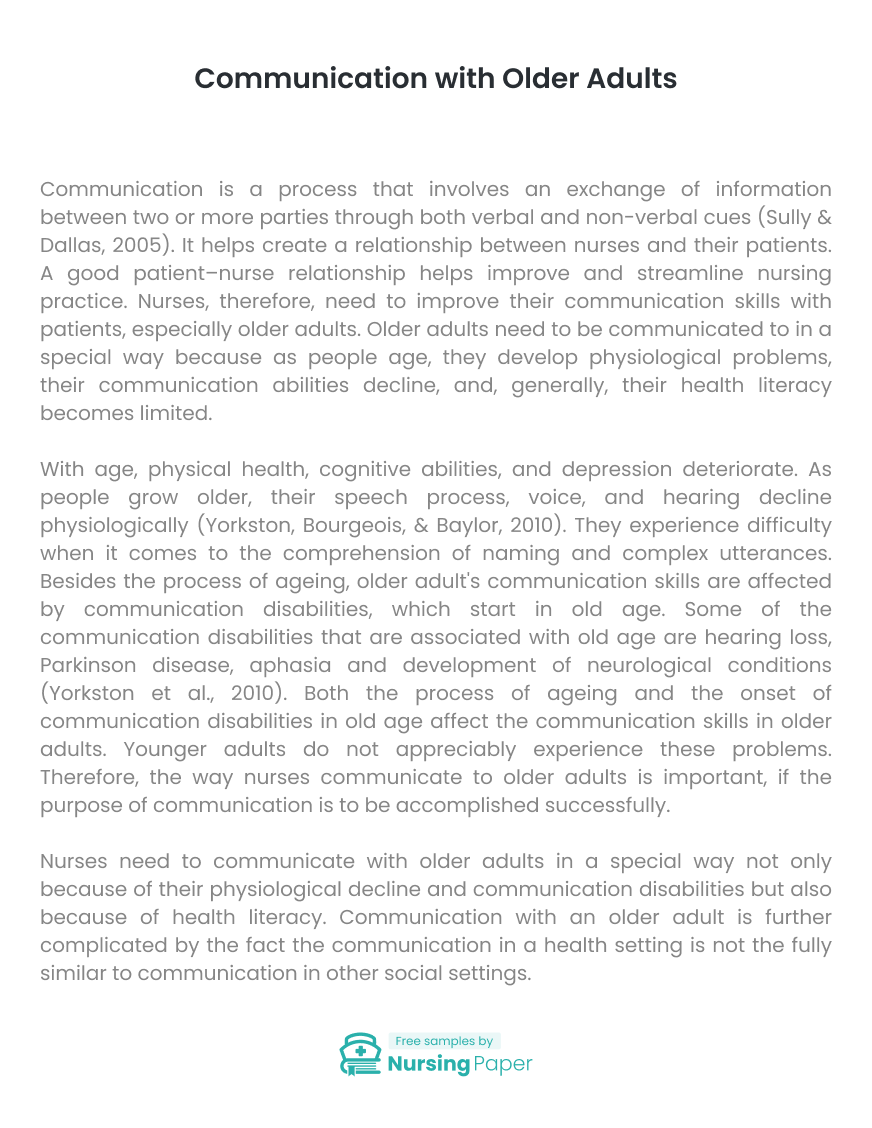
Communication With Older Adults
Introduction
Communication is a process that involves an exchange of information between two or more parties through both verbal and non-verbal cues (Sully & Dallas, 2005). It helps create a relationship between nurses and their patients. A good patient–nurse relationship helps improve and streamline nursing practice. Nurses, therefore, need to improve their communication skills with patients, especially older adults. Older adults need to be communicated to in a special way because as people age, they develop physiological problems, their communication abilities decline, and, generally, their health literacy becomes limited.
With age, physical health, cognitive abilities, and depression deteriorate. As people grow older, their speech process, voice, and hearing decline physiologically (Yorkston, Bourgeois, & Baylor, 2010). They experience difficulty when it comes to the comprehension of naming and complex utterances. Besides the process of ageing, older adult’s communication skills are affected by communication disabilities, which start in old age. Some of the communication disabilities that are associated with old age are hearing loss, Parkinson disease, aphasia and development of neurological conditions (Yorkston et al., 2010). Both the process of ageing and the onset of communication disabilities in old age affect the communication skills in older adults. Younger adults do not appreciably experience these problems. Therefore, the way nurses communicate to older adults is important, if the purpose of communication is to be accomplished successfully.


Nurses need to communicate with older adults in a special way not only because of their physiological decline and communication disabilities but also because of health literacy. Communication with an older adult is further complicated by the fact the communication in a health setting is not the fully similar to communication in other social settings. Health literacy is, therefore, an important factor in healthcare communication, especially as pertains to communication with older adults. Healthcare literacy in a third of adults older than 65 years has been approximated to be either marginal or inadequate (Yorkston at el., 2010). It follows that nurses need to adjust their language and vocabulary when communicating with older adults as compared to younger adults.
One clinical example involves a woman whose communication skills continuously deteriorated because of her dementia. She found her retirement at the age of 65 hard to keep up with and descended into depression. Her depression was worsened by the death of her husband in early her early seventies. She was later diagnosed with dementia, which partly led to her admission to hospital. She is experiencing “difficulty communicating her needs” (Jootun & McGhee, 2011, p.45).
In light of the discussion, it is apparent that the way that nurses communicate to older adults is important. As people age, they experience physiological declines, which in turn hampers communication. Communication disabilities also develop in peopleas they grow old. Lastly, older adults have limited health literacy, which makes it hard to understand nurses. Nurses need to take into account all the three factors, among any other possible others when communicating with older patients. The way nurses communicate with older adults is important.

1. Jootun, D., & McGhee, G. (2011). Effective communication with people who have
2. Dementia. Nursing Standard, 25(25), 40-46.
3. Sully, P., & Dallas, J. (2005). Essential communication skills for nursing practice. St. Louis, MO: Mosby.
4. Yorkston, K. M., Bourgeois, M. S., & Baylor, C. R. (2010). Communication and ageing. Physical Medicine and Rehabilitation Clinics of North America, 21(2), 309-319.



The download will start shortly.

The download will start shortly.
 Subject:
Nursing
Subject:
Nursing  Number of pages: 6
Number of pages: 6  Subject:
Medicine
Subject:
Medicine  Number of pages: 5
Number of pages: 5  Subject:
Nursing
Subject:
Nursing  Number of pages: 7
Number of pages: 7  Subject:
Nursing
Subject:
Nursing  Number of pages: 2
Number of pages: 2  Subject:
Health and Social Care
Subject:
Health and Social Care  Number of pages: 2
Number of pages: 2  Subject:
Nursing
Subject:
Nursing  Number of pages: 13
Number of pages: 13  Subject:
Nursing
Subject:
Nursing  Number of pages: 8
Number of pages: 8  Subject:
Medicine
Subject:
Medicine  Number of pages: 11
Number of pages: 11  Subject:
Medicine
Subject:
Medicine  Number of pages: 4
Number of pages: 4  Subject:
Nursing
Subject:
Nursing  Number of pages: 3
Number of pages: 3  Subject:
Nursing
Subject:
Nursing  Number of pages: 5
Number of pages: 5  Subject:
Health and Social Care
Subject:
Health and Social Care  Number of pages: 4
Number of pages: 4  Subject:
Health and Social Care
Subject:
Health and Social Care  Number of pages: 4
Number of pages: 4  Subject:
Nursing
Subject:
Nursing  Number of pages: 9
Number of pages: 9 
